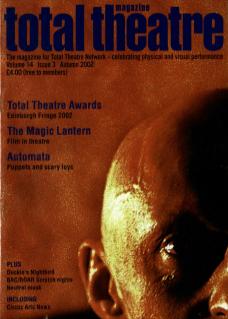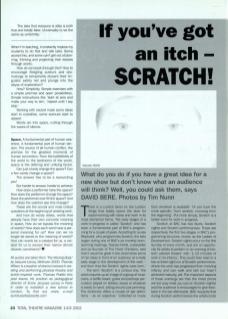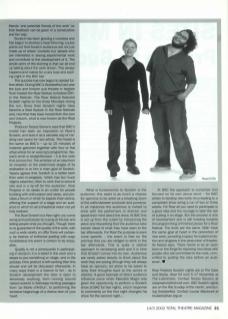There is a current trend on the London fringe that boldly opens the door for experimenting with ideas and work in its most elemental forms. The early stages of a work-in-progress is called 'Scratch' and has been a fundamental part of BAC's programming for a couple of years. According to Louise Blackwell, who programmes Scratch, the idea began during one of BAC's six-monthly brainstorming meetings. Kazuko Hohki, a storyteller and co-founder of The Frank Chickens, said that it would be great if she could show some of her ideas in front of an audience at a really early stage in the development of the work – and from that the Scratch nights were born.
The term 'Scratch' is a curious one. The word conjures up an image of a group of musicians, a skiffle board, guitar and perhaps percussion played on bottles, boxes or whatever is easily to hand, sitting around just jamming. The dictionary offers a couple of apt definitions – as an adjective: ‘collected or made from whatever is available’. Or you have the more specific: ‘from scratch, meaning from the beginning'. Put more simply, Scratch is a better word for work-in-progress.
Scratch at BAC has two faces, Scratch nights and Scratch performances. These are respectively the first two stages in BAC's programming structure, known as the Ladder of Development. Scratch nights occur on the first Sunday of every month, and are an opportunity for artists to perform in 'an evening of low-tech cabaret theatre' with 1-10 minutes of work in its infancy. This could then lead to a two or three night run of Scratch performance, where the work has progressed from mewling infancy and can walk and talk but hasn't achieved maturity, yet. The important aspects of these evenings are that the ticket prices are low (pay what you can on Scratch nights) and the audience is encouraged to give feedback in the bar afterwards. BAC requests that during Scratch performances the artists invite ‘friends and potential friends of the work' so that feedback can be given in a constructive and fair way.
Scratch has been growing in success and has begun to develop a loyal following. Louise points out that Scratch audiences are not just made up of artists' contacts but people who are interested in seeing experimental work and contributing to the development of it. ‘The whole point of the evening is that we all end up talking about the work shown. This always happens and makes for a very busy and exciting night in the BAC bar.'
This success has now begun to spread further afield. During BAC's Octoberfest last year the Lion and Unicorn pub theatre in Kentish Town hosted the Roar festival (a festival within the festival). The Roar festival featured Scratch nights on the three Mondays during the run. Since then Scratch nights have become a fixed feature in the Roar festivals and, now that they have moved from the Lion and Unicorn, what is now known as the Roar Projects.
Producer Tassos Stevens says that BAC's model has been an inspiration to Roar's Scratch, and sees it as a valuable way of creating new space for new artists. The model is the same as BAC's – up to ten minutes of material gathered together with four or five other artists for an evening's programme. Tassos' remit is straightforward – it is the work that comes first. The ambition of an idea from its inception to the preliminary stages of its realisation is to him a main goal of Scratch. Tassos agrees that Scratch is a better term than work-in-progress, which has too much stigma attached, often to work that is ‘second rate and is a rip-off for the audience'. Roar Projects in its ideals is an outlet for people bursting with enthusiasm and ideas, and provides a forum in which to explore their visions, offering the support of a stage and an audience in which to air a theatrical vision not yet fully realised.
The Roar Scratch is a free night: you come along and participate by buying at the bar and telling people what you thought. Though there is no guarantee of the quality of the work, with such a wide variety on offer there will certainly be flashes of brilliance jostling with crap: nonetheless the event is certain to be enjoyable.
Quality is not a prerequisite in participating in Scratch; it is a belief in the work and a desire to put something on stage, and in the process if the product is left wanting then this should and will be discussed afterwards. In many ways there is a licence to fail – as in Scratch development the door is open to absolutely anything, from running around naked covered in Sellotape reciting passages from Le Morte d'Arthur, to performing the tentative beginnings of a drama born of your heart.
What is fundamental to Scratch is the audience: this event is as much a chance for opinions to be aired as a breaking down of the walls between producer and purveyor. In all instances the audience is invited to drink with the performers or director and speak their mind about the show. At BAC this is set up from the outset by introducing the piece and requesting that the audience take certain ideas of what they have seen to the bar afterwards. For Roar the purpose is even more specific – the event is free on the premise that you are obliged to drink in the bar afterwards. This is quite a radical approach to developing work and it is here that Scratch comes into its own. Audiences are rarely asked directly to think about the work they are seeing (though they will always have an opinion), let alone to be asked to relay their thoughts back to the actors or director. A good example of direct audience influence came when Marcello Magni was given the opportunity to perform a Scratch show at BAC for two nights, and in response to comments on the first night changed his show for the second night...
At BAC the approach is contained and focused on its own venue remit – for BAC artists to develop new work, thus leading to a completed show airing a run of two or three weeks. For Roar all you need to participate is a good idea and the courage to take the risk of putting it on stage. But the process is one of development and is still heading towards the programming of finished pieces for a Roar festival. The ends are the same. Both have the same goal at heart in the promotion of new work, providing a space for experimentation and progress in the production of theatre. As Tassos says, ‘There needs to be an open door on the fringe for exploring new ideas with people who are committed to the work, committed to putting the idea before an audience.’
Roar Projects Scratch nights are at The Gate and Arcola. Roar 04 runs 5-17 November at The Latchmere. Contact Tassos Stevens at roarproject@hotmail.com. BAC Scratch nights are on the first Sunday of the month, and during Octoberfest. Contact Louise Blackwell at louise@bac.org.uk


